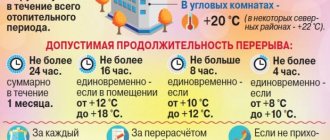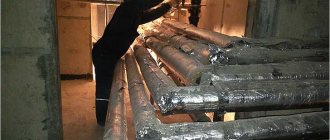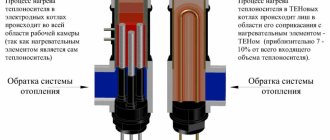Author of the article
Alexander Georgievich Kondratiev
An electrical engineer by training, he worked as an electronics engineer, chief engineer at a food company, and general director of a construction organization.
It's cold and damp outside, and residents are impatiently waiting for the heating to be turned on. Until recently, the heating season began on schedule. This is extremely inconvenient both for residents of an apartment building and for public utilities. Residents could wait weeks for their heating to be turned on when temperatures outside were low. Or walk like boiled crayfish at high temperatures.
Now the heat supply depends on the weather. Given the country’s extensive territory, heating will be turned on in different cities on different dates in the fall of 2022.
Who decides on the start of the heating season and on what basis?
Tying the start of the heating season to calendar dates turned out to be ineffective. This led to improper consumption of thermal energy.
In 2011, the Russian government signed Resolution No. 354. It regulates the supply of heat to the apartments of apartment building owners. According to the law, local authorities regulate standards for turning on heating in a region or locality. They are guided by the average daily temperature and weather forecast.
The average daily temperature should not exceed +8 degrees Celsius for five days. This is the main condition for turning on central heating.
To do this, measurements are taken at different times of the day. Typically, the coldest time and maximum daytime temperature are selected. Add these indicators and divide by two. The result is an average daily result.
Since the decrease in air temperature may be short-term, long-term weather forecasts are also taken into account. If prolonged warming is forecast, there is no need to turn on the heating supply.
The timing of the start of the heating period is regulated by the “Rules for the provision of utility services to owners and users of premises in apartment buildings and residential buildings” (approved by Decree of the Government of the Russian Federation on May 6, 2011 No. 354). The general rule is that the heating period should begin no later than the day following the end of the 5-day period during which the average daily outdoor temperature is below 8 degrees. The corresponding decision is made by the local government body.
But the preparation of the housing stock for the autumn-winter period (AWP) begins in the summer. To increase the efficiency of this work, local administrations approve plans that record activities and deadlines for their implementation.
In preparation for winter, a set of devices that ensure uninterrupted supply of heat to apartments is checked and necessary repairs are carried out: boiler rooms, intra-house networks, group and local heating points in houses, heating and ventilation systems. We carry out flushing and hydraulic tests, repairs, verification and adjustment of the in-house heating system. Work on behalf of residents is carried out by organizations that manage apartment buildings (management companies, HOAs, housing cooperatives) or resource supply organizations. Monitoring the progress of work to prepare for winter is carried out by local authorities, owners of premises in apartment buildings and housing supervision authorities.
Preparing an apartment building
to the passage of the heating season
(Slide 2)
In accordance with the Rules for assessing readiness for the heating season, approved by Order of the Ministry of Energy of Russia dated March 12, 2013 No. 103 (hereinafter referred to as Rules No. 103), consumers of thermal energy, including residential apartment buildings (MKD) must be prepared for the next heating season no later than September 15.
The main condition for preparing residential buildings for winter is their proper technical operation throughout the year and timely maintenance.
(Slide 3)
Depending on the method of managing the MKD, the responsibility for preparing the house for the next heating period rests with:
- management company servicing apartment buildings;
- owners of apartment buildings under direct management;
- HOA, housing cooperative.
Financing is carried out at the expense of the owners (“Rules for the maintenance of common property in an apartment building”, approved by Decree of the Government of the Russian Federation of August 13, 2006 No. 491). There are no budget funds allocated for preparing apartment buildings for winter!
(Slide 4)
The schedule for preparing the housing stock and its engineering equipment for operation in winter conditions should be drawn up taking into account the results of the spring inspection of residential buildings and deficiencies identified during the past winter period.
Monitoring the progress of winter preparation work is carried out by local government bodies, housing owners and their authorized representatives, as well as housing supervision authorities.
The start and end dates of the heating season are set by local governments. The heating period must begin no later than and end no earlier than the day following the end of the 5-day period, during which, respectively, the average daily outside air temperature is below 8 degrees Celsius or the average daily outside air temperature is above 8 degrees Celsius.
Local governments, taking into account the proposals of the organization that maintains this housing stock, also determine the start and completion dates for winterization of each residential building and infrastructure facilities.
Scope of work
(Slide 5)
When preparing the housing stock for operation in winter conditions, in accordance with the Rules and Standards for the Technical Operation of the Housing Stock (Resolution of the State Construction Committee of the Russian Federation dated September 27, 2003 N 170), it is necessary:
- by the beginning of winter, ensure high-quality repairs with the elimination of detected malfunctions of external enclosing structures: walls, roofs (especially without attics), attic floors, above technical undergrounds (basements), driveways, window and door fillings, as well as heating stoves, chimneys, gas ducts and installations with gas heaters (with checking the draft in chimneys and the condition of the heating stove automation);
- bring drainpipes and the territory of households into technically sound condition, ensuring unimpeded drainage of atmospheric and melt water from the building, including from descents (entrances) to the basement, window pits and blind areas;
- ensure waterproofing of foundations, basement and basement walls and their adjoining to adjacent structures, as well as normal temperature and humidity conditions in basements and attics.
(Slide 6)
The entire complex of devices that ensure uninterrupted supply of heat and hot water to all rooms and engineering structures is subject to preparation for winter (hydraulic testing, repair, inspection and adjustment):
- boiler rooms (if they are serviced by housing organizations),
- power networks to buildings maintained by housing organizations;
- points (central and individual);
- heating, ventilation and hot water supply systems.
Boiler rooms, heating points and units must be provided with automation equipment, instrumentation, shut-off control equipment, wiring diagrams for heating systems, hot water supply, hot water supply, supply and exhaust ventilation, designs indicating the use of equipment in various operating modes (filling, recharge, draining water from heating systems, etc.), equipment technical data sheets, operating charts, parameter logs, equipment defect logs.
Internal networks must be adjusted with adjustments to the calculated diameters of throttling devices at the thermal (elevator) unit.
Gas facilities must undergo adjustment of shut-off safety valves and pressure regulators for the winter period.
The equipment of pumping stations and fire-fighting equipment systems must be equipped with main and backup equipment, automatic switching on of backup pumps in case of failure of the main ones is ensured, adjusted and in good working order.
(Slide 7)
During the period of preparing the housing stock for work in winter conditions, the following is organized:
- training and retraining of boiler house workers, heating points, emergency service workers and maintenance workers, janitors;
- preparation of emergency services (vehicles, equipment, communications, tools and equipment, supplies of materials and personnel training);
- preparation (restoration) of diagrams of in-house cold and hot water supply systems, sewerage, central heating and ventilation, gas, indicating the location of shut-off valves and switches (for mechanics and electricians to eliminate accidents and malfunctions of in-house engineering systems);
- in unheated premises, they provide repairs to the insulation of water supply and sewerage pipes and fire-fighting water supply systems.
If there is water in the basements, you should pump it out, turn off and disassemble the irrigation water supply, and insulate the water metering unit; ensure uninterrupted operation of sewer outlets, inspection wells of the yard network and general outlets at the ends of the building from the collection pipeline laid in the basement (technical underground).
In unheated premises, during preparation for winter, you should check the condition and repair the insulation of water supply and sewerage pipes, central heating and hot water supply, and insulate the fire-fighting water supply system.
Vents in basements and technical undergrounds can be closed for the winter only in case of severe frosts.
(Slide 
Work performed in preparing residential buildings for operation in the autumn-winter period includes:
- insulation of window and balcony openings
- replacing broken glass windows and balcony doors
- insulation of entrance doors to apartments.
- insulation of attic floors
- insulation of pipelines in attics and basements
- strengthening and repair of parapet fences
- checking the serviceability of dormer windows and blinds
- production of new or repair of existing walking boards and walkways in attics
- repair, adjustment and testing of central heating systems
- repair of stoves and kitchen hearths
- insulation of boilers
- insulation and cleaning of smoke ventilation ducts
- replacement of broken glass windows and doors of auxiliary premises
- conservation of irrigation systems
- strengthening flag holders
- checking the condition of air vents in building basements
- repair and insulation of external water taps and standpipes
- supply of door closers for entrance doors
- repair and strengthening of entrance doors
!!! The scope of work and the timing of their implementation are reflected in the schedule, which is drawn up for a week, month and year.
Work to prepare a house for winter is carried out by a contractor for the maintenance of residential buildings and their engineering equipment. This is either a resource supplying organization with which a resource supply agreement has been concluded, or another specialized organization.
City specialized enterprises that own, lease or are in economic control of heat and water supply structures and utility networks are responsible for the quality and timing of bringing them into full working order by the heating season.
In the receipt for payment of housing and communal services, the costs of carrying out work to prepare for the heating season are included in the first line “Maintenance of common property”.
!!! When preparing an apartment building for the heating season, it is necessary to flush the in-house heating system and equipment. The most effective method of flushing is hydropneumatic flushing.
Why is flushing the heating system necessary?
(Slide 9)
Flushing the heating system is a set of operations to remove deposits in the heating system lines.
In the heating systems of most residential buildings, offices and enterprises, water, as is known, makes its own closed path. And it contains a whole “cocktail” of calcium salts, magnesium salts and even sludge, which tend to settle on the walls of radiators, pipes and boilers.
These deposits “grow” year after year, reducing the working cross-section of heating devices. This leads to the appearance of high thermal resistance, since scale does not conduct heat well, and at the same time the throughput of the pipes decreases. The consequence of this is an increase in energy consumption (fuel or electricity), since in order to maintain the temperature of the heating radiators at the required level, it is necessary to increase the heating temperature of the water in the boilers.
Interesting! Practical observations have shown that pipelines of heating systems with 10 years of operation are clogged with deposits by more than 50%. And every millimeter in the thickness of deposits increases fuel consumption by about 20-25%.
Thus, pipes and radiators of a 5-year-old structure already require a heating system flushing certificate. In principle, this is an ordinary “service” operation, without which long-term, high-quality operation of heating systems is impossible.
Assessing readiness for the heating season
(Slide 10)
Based on the results of the work done, the readiness of the apartment building for the heating season is assessed. It is carried out by carrying out relevant inspections by local governments of settlements and urban districts.
In relation to MKD, verification is carried out by determining compliance with the requirements of Rule No. 103:
- persons who, in accordance with housing legislation, manage an apartment building and purchase thermal energy (power) and (or) coolant for the provision of utility services in terms of heating and hot water supply. In relation to these persons, the measures taken by them to prepare for the heating season are also checked;
- persons who are the owners of residential and non-residential premises in an apartment building, who have entered into heat supply agreements with a heat supply organization in accordance with housing legislation.
In order to conduct inspections of thermal energy consumers, representatives of Rostechnadzor and the housing inspection may be included in the commission by agreement.
In order to conduct an inspection of thermal energy consumers, representatives of a single heat supply organization in the heat supply system, as well as the organization to whose heat and networks the heat consuming installations of thermal energy consumers are directly connected, can be involved in the work of the commission upon approval.
(Slide 11)
The readiness of housing and communal services facilities for operation in winter conditions is confirmed by the presence of:
- passports of the house’s readiness for operation in winter conditions (Appendix No. 9 of the “Rules and Standards for the Technical Operation of the Housing Stock”).
- acts on the serviceability of safety automation and control equipment (CPI) of boiler houses and engineering equipment of buildings.
- certificates of technical condition and serviceability of fire-fighting equipment.
- provision of fuel to boiler houses and the population before the start of the heating season: solid - not less than 70% of the heating season's demand, liquid - based on the availability of warehouses, but not less than the average monthly consumption;
- a supply of sand for sprinkling sidewalks at the rate of at least 3-4 m 3 per 1 thousand m2 of harvested area.
- acts on the readiness of harvesting equipment and equipment
- acts on readiness for winter with an assessment of the quality of preparation of buildings and apartments for winter and an act for each facility, as well as acts for testing, flushing, and adjustment of cold, hot water supply and heating systems.
!!! All acts are approved and submitted to the local government body by September 15.
The results of the inspection are documented in an act of checking readiness for the heating season (hereinafter referred to as the act).
The report contains the following conclusions based on the results of the inspection:
- the object of inspection (apartment building) is ready for the heating period;
- the object of inspection (apartment building) will be ready for the heating season, subject to the elimination of comments on the readiness requirements issued by the commission within the prescribed period;
- the object of inspection (apartment building) is not ready for the heating season.
The original of the inspection report is kept in the administration of the municipality, copies - in the management company, HOA, housing cooperative or housing owners (with direct management).
If the house is not ready for winter, the commission draws up a list of comments with deadlines for elimination. If ready, local authorities within 15 days issue a passport of readiness for the heating period. Passports are not issued to unprepared homes. After correcting the comments and re-checking, as well as with a positive conclusion from the commission, a repeated report is issued with a conclusion about readiness for the heating period, but without issuing a passport for the current heating period.
During the winter period, uninterrupted operation of sewer outlets, inspection wells of the yard network and general outlets at the ends of buildings from a common pipeline laid in the basement should be ensured.
After the end of the heating season, the equipment of boiler houses, heating networks and heating points, all heating systems must be tested with hydraulic pressure in accordance with established requirements.
Defects identified during testing must be eliminated, after which repeated tests are carried out. Tests of heating networks are carried out in accordance with established requirements.
Thank you for your attention!
In the next lesson we will cover the topic:
“The procedure for providing utilities, limits of responsibility, fines”
When will heating be provided in St. Petersburg?
Cold, windy and rainy weather set in in the northern capital at the beginning of September. Citizens are eagerly waiting for the batteries to be turned on. The Committee on Energy and Engineering Support of St. Petersburg reported that in apartment buildings everything is ready to supply heat (information as of 09/03/2021). Heat supply will begin in mid-September, despite the fact that the average air temperature is forecast to be above +8 degrees. Hospitals, kindergartens and schools will be the first to connect.
Approximately from September 15, periodic flooding will begin in apartments (the batteries will be turned on for short periods and then turned off). Regular heat will be turned on when average daily temperatures drop below +8.
Nuances
Although the law requires that the timing of the heating season be determined by local authorities, there are still opportunities to deviate from this norm. If the communications are in order and checked for leaks and other faults, the management company can start supplying heat without waiting 5 days with an average daily temperature of less than +8 degrees. This is also allowed based on numerous requests from residents.
There are several other important nuances associated with the start of the heating season:
- Supplying heating later than 5 days with an average daily temperature below +8 degrees is a direct violation of the legislation of the Russian Federation. For this, organizations that provide such a service face serious fines.
- If apartment owners believe that the heating is turned on too late, they have the right to enter into an agreement with the heat supply organization. You can enter the exact dates of switching on and off. Then heating will be supplied at the specified time without taking into account the outside temperature. However, it is necessary to organize a meeting of residents and ensure that the majority of residents express their consent in writing. This can be difficult to do.
- If the heating has already been turned on, but the house is still cold, you should not complain right away. The system is adjusted by increasing the pressure gradually. Therefore, it sometimes takes several days for the batteries to become hot.
- It is forbidden to unauthorizedly weld pipes or install radiators with a large number of sections to make it warmer. This allows you to make the temperature of the house more comfortable, but may disrupt the operation of the heating system. Residents of other apartments will suffer - it will become cooler for them. Therefore, after some time, the relevant services will learn about such a violation. The owner will be fined and will still be required to return the old batteries.
When will the heating be turned on in Moscow in 2022?
The Moscow City Hall makes this decision based on the average daily air temperature. If you believe the weather forecast, September in the capital will be warm, and only at the very end of the month the temperature will drop below +8 degrees. Therefore, heat should be provided to apartments no earlier than October 1.
The dates when the heating was turned on in the previous five years are in our table.
| Year | Start date of the heating season in Moscow |
| 2016 | September 21 |
| 2017 | September 28 |
| 2018 | October 1 |
| 2019 | 23 September |
| 2020 | September 28 |
What temperature should be in the apartment
According to SanPiN 2.1.2.2645-10 “Sanitary and epidemiological requirements for living conditions in residential buildings and premises”, the optimal and permissible temperature standards in the premises of residential buildings are:
| Name of premises | Air temperature, °C | |
| optimal | acceptable | |
| Cold season | ||
| Living room | 20-22 | 18-24 |
| The same, in the areas of the coldest five-day period (minus 31°C and below) | 21-23 | 20-24 |
| Kitchen | 19-21 | 18-26 |
| Toilet | 19-21 | 18-26 |
| Bathroom, combined toilet | 24-26 | 18-26 |
| Inter-apartment corridor | 18-20 | 16-22 |
| Lobby, staircase | 16-18 | 14-20 |
| Storerooms | 16-18 | 12-22 |
| Warm period of the year | ||
| Living room | 22-25 | 20-28 |
Approximate schedule for turning on heating in Russian cities in 2021
Here is a schedule of heating connections last year (2020) in Russian cities based on orders from local administrations. In the fall of 2022, heat turn-on dates will be close to last year's numbers. But they may differ in one direction or the other.
For clarity, we have summarized the data on what date the heating is turned on in a table.
| City | Date of supply of thermal energy |
| Moscow | September 28, submitted early |
| Saint Petersburg | October 15 |
| Novosibirsk | September 22nd |
| Ekaterinburg | September 15th |
| Kazan | September 21 |
| Nizhny Novgorod | September 22nd |
| Chelyabinsk | September 28 |
| Samara | September 22nd |
| Omsk | September 22nd |
| Rostov-on-Don | October 15 |
| Ufa | September 17 |
| Krasnoyarsk | 23 September |
| Voronezh | October 15 |
| Permian | September 15th |
| Volgograd | October 12 |
| Krasnodar | October 16 |
Having analyzed the data, we see that the difference in heating supply dates in different regions is more than a month.
How does this happen
Preparatory work for the heating season begins in April 2022. Local authorities, together with service organizations, prepare regulatory documents.
The documents reflect the provisions:
- A representative of an organization that provides operation and maintenance of thermal power facilities. A specialist is appointed from persons with higher thermal engineering education. His deputy is appointed in the same way. They are required to undergo certification annually.
- The commission that prepares the energy complex for the heating season. Members are required to monitor the serviceability of thermal facilities and performance during the autumn-winter period.
- The start and end dates for preparatory work are determined.
- Measures are drawn up according to which the equipment is prepared for operation in the autumn-winter period. Activities are coordinated with all interested organizations. After approval it is approved.
- Measures are being developed to prepare documentation and monitor the verification of work, the condition of thermal equipment and readiness for operation.
- The order of commissioning and testing work is determined.
Upon completion of the work, an acceptance certificate and technical passport are drawn up. After the heating is turned on, the apartments must maintain the temperature presented in the table.
| Room | Permissible temperature in degrees Celsius |
| Living rooms | At least 18 |
| Premises with external walls on three sides | Not lower than 20 |
| Bathrooms | Not lower than 25 |
| Staircases and cages | 14-20 |
| Inter-apartment corridors | 16-22 |
| Basements and attics | Not lower than 4 degrees |
This shows that for permanent residence, the temperature in the apartment should be maintained at 18-25 degrees, and in industrial premises at 16-24 degrees. This is enshrined in law.
It turns out that heating fees can be returned! Read where to complain and what to do if it’s cold in your apartment during the heating season.
First of all, heating is provided to children's and socially significant institutions. Then they turn on the heating for residents in apartment buildings.
What law regulates the process of heating residential premises?
Relations in the field of heat supply to residential premises are regulated at the federal level by the following legislative acts:
- Federal Law “On Heat Supply” dated July 27, 2010 No. 190-FZ.
- Decree of the Government of the Russian Federation “On the provision of public services” No. 354 dated May 6, 2011.
- GOST 30494-2011 “Indoor microclimate parameters” dated 01/01/2013.
The above documents define the relationship between owners and utilities, the start and end dates of the heating season, as well as the rules for the provision and calculation of utilities.
The house is cold, but the heating is not turned on
People are freezing, but the heating season still hasn’t started. The only way out is to pester the city authorities: call the administration and the housing and communal services hotline, write to the website and email.
Another situation: the heating season has begun, all houses are connected, but your radiators are cold. In this case, you must wait five days, as the heating is started according to schedule. If the batteries are not turned on during this time, this indicates a problem that needs to be solved.
To do this, residents must:
- Contact the housing department. You can call, or better yet write a statement in duplicate. Keep one for yourself with a mark of acceptance. Specialists are required to check the system as soon as possible. Take all measures to resolve immediately, whether there is air in the system or other technical issues. A specialist solves a local issue on the spot.
- If the radiators are cold throughout the entire entrance, a commission must be invited. It includes representatives of the management company, housing inspection and residents of the apartment building. Measurements are taken and a report is drawn up. It is drawn up in triplicate for each party. This is the basis for recalculating the heating fee and for making a decision to eliminate the malfunction.
- If the management company’s employees do not correct the malfunction, residents are required to file a complaint with a higher organization, local administration and Rospotrebnadzor. Usually this is enough to make the apartment comfortable.
Where to complain if there is no heating
Knowing where to complain if there is no heating, you can achieve a quick solution to the problem. If, after inspecting the heating system by a utility worker, the heating is still not turned on, you can contact the following authorities:
- to the management company servicing the house;
- to a housing association at home;
- to a service that maintains the house;
- to the city housing inspectorate.
If the requests and demands of the residents were ignored by the employees of the above authorities, where to complain about heating in this case? Then more stringent measures should be taken.
You should contact:
- Rospotrebnadzor. You can send a complaint by mail or using the online service of this organization;
- prosecutor's office The complaint is sent in the same way as in the previous case;
- local administration;
- court.
But a complaint about the lack of heating should be sent to these authorities if the utility service specialists have not taken any measures and ignore the complaint of the residents of the house. After all, it is possible that a housing office employee will arrive as soon as possible after the call and quickly solve the problem. If a utility service does not perform its duties at the proper level, higher authorities can identify the culprit and fine the organization, bringing it to serious responsibility.
Heating interruptions can occur not only in a residential apartment, but also in a company’s office premises. Employees often have a question: if there is no heating at work, where can they complain? First, you should inform the head of the company about the presence of such a problem, and also inform the landlord if the office is rented. Further actions are the same as in the absence of heating in the apartment.
Can the heat be turned on earlier or later than the official deadline?
The approved schedule may change in different directions. Resolution No. 354 defines the conditions for turning on the heating.
Residents should take into account that the 2022 heating season will begin with an average daily temperature of no higher than 8 degrees Celsius.
To do this, measure the outside air temperature. Measure twice a day. At night during the coldest period and during the day when the temperature is highest. Add the readings and divide by two. This results in an average temperature. It should be less than or equal to eight degrees for the last five days. At higher temperatures, the heating is not turned on: the apartments are still relatively comfortable, and the heating system does not freeze.
When the air temperature is high, residents will have to suffer from the heat and overpay for heat. Thus, the heat can be turned on earlier or later than planned. It all depends on the average daily outside temperature and the weather forecast.
What problems may arise when starting heating
If the heating is turned on, and it’s cold in your apartment, most likely you need to bleed the air that has accumulated in the pipes - eliminate the airlock that is preventing the coolant from passing through. You can bleed the air yourself, or you can call ADS and they will send a plumber.
If you tried to bleed the air yourself and nothing changed, perhaps a pipe is clogged somewhere and a blockage has formed - call a plumber. If the shut-off valves break and/or a leak develops, urgent repairs are needed. Submit an application to the ADS (this can be done by calling or contacting them in person).











